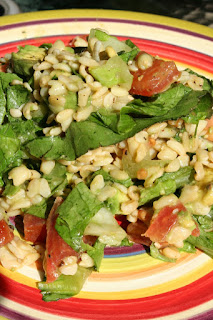The course comprises all-Spanish instruction, both written and spoken. When starting from a base vocabulary of nothing more than a handful of words, this is akin to learning as a child does, intuiting words and meaning from context and gestures. Sometimes this goes wrong and we present a row of blank faces to our indefatigable profesora.
The trouble with not immediately understanding everything is not knowing what can safely be ignored. Today was a case in point, as we were distracted for quite a while in an attempt to grasp the finer points of an arcane decision by the R.A.E. - Real Academia Española, the Madrid-based arbiters of the Spanish language - to remove an accent from a group of words.
Aside:
Aside from the tilde above ñ and the odd diaresis (e.g. ambigüedad), Spanish uses mostly one kind of accent (technically a diacritical mark), the acute. The primary use of this is to indicate the syllable on which spoken emphasis should be placed, if it differs from the usual rules (on the penultimate syllable if it ends in a vowel, 'n' or 's', and on the final syllable if it ends in any other consonant). So, ajo (garlic) is stressed on the 'a', while in ají (chilli) it falls on the 'i'. The second use is purely cosmetic, as it distinguishes two otherwise identical words from one another. So, el is 'the', while él means 'he'. In some cases, the words have broadly the same meaning but a different function in the sentence. When used as an interrogative ("who is it?"), 'who' is written quién, but when used as a relative pronoun (the man whom I told you about") it appears as quien, without the accent.
With that aside aside, the case of the disappearing tilde becomes a little clearer. Compare the sentences "este libro es bueno" (this book is good) and "compro éste" (I will buy this one, i.e. this book I just mentioned). In the latter, éste stands alone, referring to the book just indicated, and appears with an accent to distinguish it from the former este, which modifies the word 'libro'. The R.A.E. abolished the tilde on the latter, as this apparently caused confusion. However, its use is still recommended when it can help resolve ambiguity in meaning. For example, ¿por que compraste éste libro usado? "why did you buy this used book? (out of all the books you could have bought) and ¿por que compraste este libro usado? "why did you buy this used book?" (I thought you went out for milk).
Fortunately, the lesson ended on a less academically serious note as we teamed up to write descriptions of various rooms in the school. Being tasked with el baño (the WC), we soon discovered that baño does not in fact refer to the toilets themselves, only to the room. Standard Spanish apparently uses el retrete or el inodoro, while some people like to use la taza, but since this literally means 'cup', some find the concept a bit odd. However, in Chile, they appear to have adopted and repurposed the English word 'water' to refer to the ceramic throne. Said with a Chilean Spanish accent, this just doesn't sound right at all. I'm also pretty sure the R.A.E doesn't approve.
 |
| Salad of mote de trigo (husked wheat) |
After another glorious salad lunch put together by K and enjoyed in the sun on la terraza, it was time for our private lessons. Conversation class in the afternoon bounced around a few topics, some grammatical - such as the subtle and tricky distinction between the prepositions por and para - as well as weightier social discussion. The social reform that Salvador Allende put into motion before the 1973 coup was entirely undone and reversed under the Pinochet regime. This has had long-lasting effects on the country, as the constitution written by the junta in 1980 is still in effect and few are willing to change it. Abortion was made (and remains) illegal, education is not free (there are no public universities), and the country's infrastructure and natural resources are all privately owned (often by foreign investors). It is a country that is simultaneously extremely rich and abjectly poor. Protests, such as the one that blocked off the street to the school today, are commonplace. Today's was about higher education reform. We later discovered that two people were killed in a similar protest in Valparaíso today.
At the end of the day, we had a very non-Chilean dinner of couscous and vegetables. In a country replete with corn/maize and rice, we eventually found couscous in the specialty section of the supermarket.
Our 'immersion' ostensibly continued at the school-organised pisco sour evening, which we attended last week. This week's cocktail concoctions involved basil (albahaca), mango, and forest fruits. Shamefully, we abandoned Spanish after a while, so as to get past superficial conversation and into deeper, more interesting areas of discussion with people. We also marvelled that even in a hostel in Chile, you can get good (and very reasonable) red wine.
No comments:
Post a Comment